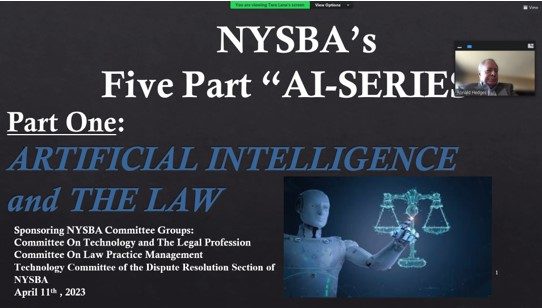Debut of Five-Part Webinar Program Offers Insight Into Artificial Intelligence as a Powerful Tool for Attorneys
4.13.2023
 The use of Artificial Intelligence by attorneys is increasing at a phenomenal rate and while its development continuously changes there are many misunderstandings about its use and evolution.
The use of Artificial Intelligence by attorneys is increasing at a phenomenal rate and while its development continuously changes there are many misunderstandings about its use and evolution.
Those were some of the topics discussed during the first part of a five-part webinar series entitled New and Existing Uses of Artificial Intelligence. The opening session on Tuesday, March 11, served as an introduction to the series.
Marissa J. Moran, professor in the law and paralegal studies department at New York City College of Technology and Ronald J. Hedges, a private law practitioner, led the discussion.
“Every day there seems to be 12 developments for AI and I think as lawyers we need to focus first on laws that might govern what we are using AI for and of course that’s just not for us, but for our clients,” said Hedges.
He pointed out that it is vital that attorneys gain the ability to converse with their clients in a knowledgeable manner.
However, there are obstacles in the way of reaching that point including developing an understanding of what specifically AI is.
In its most basic form, AI describes how computers can perform tasks normally viewed as requiring human intelligence including recognizing speech and objects and using data to make decisions and translate languages.
Other types include Generative AI, which uses machine leaning algorithms to create original content including images, videos and texts. ChatGPT is an example of Generative AI due to its ability to generate a new passage of text by processing a large database of online writings and analyzing word sequencing.
“When we think of augmented intelligence, we think of sci-fi movies such as ‘The Terminator’ or robots taking over the world. It’s kind of a futuristic use of AI. However, the thing to be mindful of is AI is designed to enhance, not replace, human intelligence,” said Moran.
Hedges added that AI is at the forefront of many discussions because of its vast potential to have a tangible impact on how business is conducted.
“I think it’s fair to say that every developer and every company is doing what they can to get into the Generative AI space right now because there appears to be a lot of market applications for it. But I think we need to put this in context.”
Moran expanded on that by indicating how AI alters how tasks are performed and that attorneys need to rethink the legal services model. She noted that two weeks ago Goldman-Sachs issued a report saying that generative AI could automate 44% of legal tax tasks in the U.S.
“It’s a watershed moment for legal departments, perhaps signaling the biggest shift in how lawyers work since the arrival of the internet. So, there are things we have to keep in mind when thinking about uses of AI and the law,” said Moran.
Hedges related it to how the internet allows AI to grasp available information through an algorithm and parse through it to provide needed information the same way an attorney used to look through case reports at a library to find a decision or point of reference.
Hedges and Moran also noted that while repetitive tasks or those based on factors that can be learned through repetition or data analysis are suited for AI, undertakings that require specialized knowledge such as nuanced legal research or complicated legal research are not so applicable, at least for the time being.

But lawyers also need to know that with AI, bias can be introduced intentionally or unintentionally.
“It’s a fundamental concern associated with AI and there have been studies that have shown algorithms can be tainted intentionally or unintentionally. Biased algorithms may be created when they are instructed to give disproportionate weight to certain factors and programmers can be influenced by their background and experience, which may lead them to rely on data that favors certain groups,” said Moran.
Hedges affirmed that it is critical for attorneys to understand where any data originated from that is inputted into an AI system.
“The first thing I would ask if I’m reviewing something an adversary put together is what type of data went into that ‘black box’ that led to an output. I would have to know who that data is being collected from and if I’m defending a request for that data, do I have access to all that information myself.”
Moran wrapped up the discussion by emphasizing that AI is a tool that requires attorneys to gain an understanding of it as it continues to evolve.
“Knowledge is always critical. Let’s just remember that AI is a tool, a powerful one, but a tool to assist the legal team and enhance good client decision making.”
The second part of the series will be held on Tuesday, May 2 and will touch on AI from a technological perspective.
Please go here to register and gain access to part one of the series.






